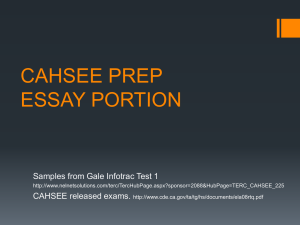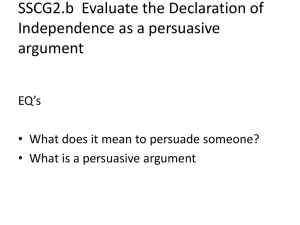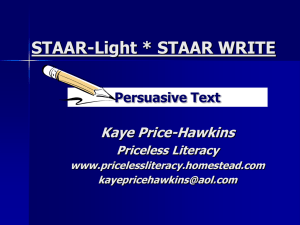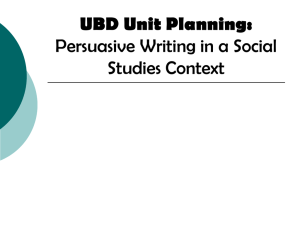Persuasive Essays
advertisement
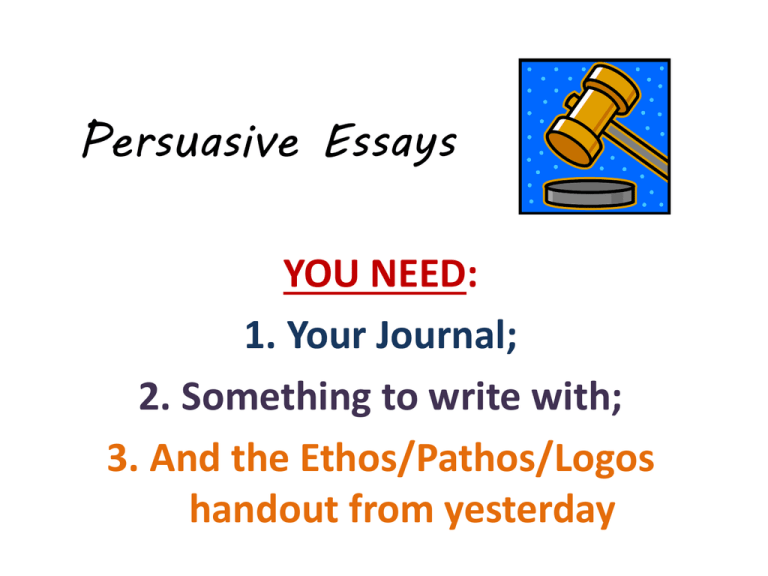
Persuasive Essays YOU NEED: 1. Your Journal; 2. Something to write with; 3. And the Ethos/Pathos/Logos handout from yesterday Journal Write • Persuasive Baseline Essay Reflection 1. Read over your essay again right now… How do you feel about your essay overall? Was the topic easy or difficult for you? Please explain. 2. Where in your essay can you identify Ethos, Pathos and/or Logos? Did you use these without realizing what you were doing or were your tactics purposeful? 3. After looking over your essay, is there anything at this point you would add/change/remove? Persuasive Strategies Handout Student Fill-In Table Journal Write 1. Do ANY of the strategies on the fill in sheet sound familiar? 2. Are any of the strategies totally new? Persuasive Essay Elaboration Strategies Introductory, Body, & Concluding Paragraphs Persuasive Essay Introductions – Taking a Stand: STATE YOUR POSITION. This is your thesis statement that includes your WHY. – Scenario/Anecdote: Provide hypothetical or personal examples to illustrate your topic and argument. – Inquiry/Questioning: Ask thought-provoking, edgy, questions to capture the reader’s interest. (careful with this one…) – Preparatory Information/Overview: Define or explain the subject before discussing it in detail. Starting with a Question: to do or not to do… • • • Ask yourself, isn’t there a better, more creative, more interesting way to start my writing? If the above is actually “no” or you are just plain stumped (like during the HSPE), make sure that your question can’t be answered with a “yes” or a “no.” If your reader can say “no,” then you’ve lost them. Why NOT start with a question? Question: Have you ever wondered…? Answer: No. Question: Have you ever been…? Answer: No. Question: Have you ever thought…? Answer: No. Question: Do you like…? Answer: Yeah. What’s it to you? Strategy ICONS? • Brainstorm visual ICONS we can use for the persuasive intro strategies: –Taking a Stand –Scenario/Anecdote –Inquiry/Question –Prep Info/Overview Persuasive Essay Body Paragraphs • Persuasive Language: Using strong words, feeling/emotion words, and repeated phrases to draw your reader into your point-of-view. • Expert Testimony: Using Voices of authority and more than 1 argument to support your position. • House that Jack Built: Illustrating/describing the cause and effect of one or both sides of your argument (A leads to B, which leads to C, etc.). • Concession/Rebuttal: Acknowledge/Anticipate & Refute opposing arguments. Journal Write • Give examples of what you think might qualify as “expert testimony” in a persuasive essay. Persuasive Essay Body Paragraphs Continued… • Compromise/Problem Solving: A solution that meets in the middle or an “ah-ha!” solution. • Facts/Statistics: Facts, numbers, percents, (citation), etc. to support your argument. • Anecdotes: Including a personal story or specific experience to give emotional appeal to your argument. Strategy ICONS? • Brainstorm visual ICONS we can use for the persuasive body paragraph strategies: –Persuasive Language –Expert Testimony –House that Jack Built –Concession/Rebuttal –Compromise/Problem Solving –Facts/Statistics –Anecdotes Persuasive Essay Conclusions – Call to Action: Implore the audience to change or take action. – Offer a Solution: Suggests some possibilities to resolve the problem posed. – Make a Prediction: Similar to a startling statement, this can be a warning or an encouragement. Strategy ICONS? • Brainstorm visual ICONS we can use for the persuasive intro strategies: –Call to Action –Offer a Solution –Make a Prediction Persuasive Essays Back (AGAIN) • While you wait, look at all the strategies we’ve discussed so far…make a little mark next to ones you might like to try… Learning Targets (Goals) • Using your ORANGE list of persuasive writing strategies, look at your essay again. • Mark 5 strategies that you might want to focus on working into a revision of your essay. Hint: you will HAVE to use Taking A Stand (Intro) and Call to Action (Conclusion). • Your GOAL is to use strategies that hit each of Aristotle’s modes of persuasion: Ethos, Logos, and Pathos.
